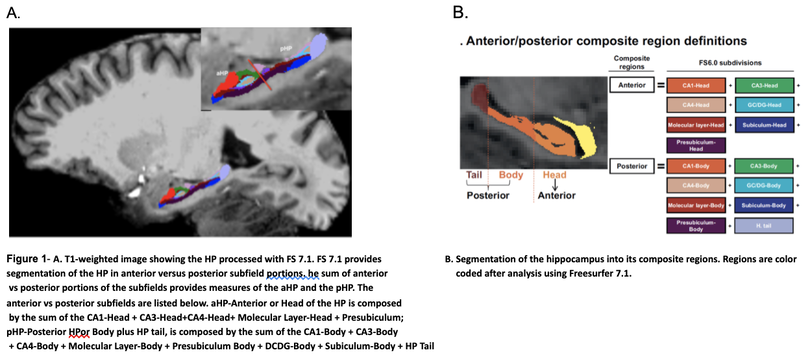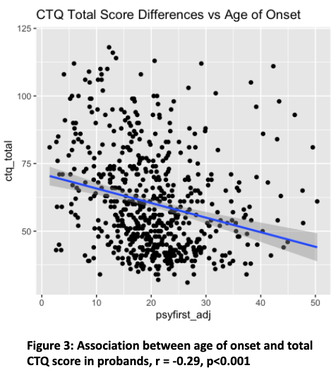The Effects of Childhood Trauma on Anterior-Posterior Hippocampus in Psychosis
By Evie Coxon
Individuals with a history of childhood trauma have been shown to be at increased risk for the development of major psychiatric disorders such as schizophrenia (SZ), bipolar disorder (BP) and schizoaffective disorder (SAD) (Duhig et al.,2015). The hippocampus (HP) formation, within the limbic system, is implicated in memory storage and plays a further role with the thalamus (HPA axis) in regulating stress response. Childhood trauma is defined by the DSM-V as ‘exposure to actual or threatened death, serious injury or sexual violence’ (American Psychiatric Association, in Diagnostic and Statistical Manual of Mental Disorders. Fifth Edition American Psychiatric Publishing; 2013). It has been associated with structural deficits in the hippocampus suggesting early life stress may directly affect hippocampal development.
In this study, we explore how a history of childhood trauma affects the anterior (aHP) and posterior (pHP) hippocampus in psychosis probands and healthy controls (HC). We also look at the age of onset of psychosis to determine whether there is a possible association between childhood trauma and the timing of psychosis development. We employ a large transdiagnostic dataset of probands from the BSNIP (Bipolar and Schizophrenia Network for Intermediate Phenotypes) dataset, unified by the presence of psychotic symptoms.
We hypothesize that early life stress mediates a reduction in the volume of aHP and pHP and that higher levels of trauma in childhood will correspond to an earlier age of psychosis onset. Although previous studies have looked specifically at how childhood trauma affects overall hippocampal volume and subfields (Samplin et. al, 2013), aHP and pHP have been separately associated with distinct cognitive functions, different genetic background and cellular composition, indicating an important venue of investigation in relation to the neurodevelopmental effects of trauma on the HP.
In this study, we explore how a history of childhood trauma affects the anterior (aHP) and posterior (pHP) hippocampus in psychosis probands and healthy controls (HC). We also look at the age of onset of psychosis to determine whether there is a possible association between childhood trauma and the timing of psychosis development. We employ a large transdiagnostic dataset of probands from the BSNIP (Bipolar and Schizophrenia Network for Intermediate Phenotypes) dataset, unified by the presence of psychotic symptoms.
We hypothesize that early life stress mediates a reduction in the volume of aHP and pHP and that higher levels of trauma in childhood will correspond to an earlier age of psychosis onset. Although previous studies have looked specifically at how childhood trauma affects overall hippocampal volume and subfields (Samplin et. al, 2013), aHP and pHP have been separately associated with distinct cognitive functions, different genetic background and cellular composition, indicating an important venue of investigation in relation to the neurodevelopmental effects of trauma on the HP.
Data collection: Psychotic probands (Schizophrenia- SZ, Schizoaffective Disorder-SAD, Bipolar Disorder-BP) were assessed using the DSM-IV SCID. CTQ (Childhood Trauma Questionnaire) scores were collected from all participants. Controls and probands received a T1-MPRAGE. Imaging was analyzed using Freesurfer 7.1.0 to extract volumes of the aHP and pHP in both the right and left hemispheres. Total intracranial volume (eTIV) was estimated using Freesurfer, for covarying purposes. QC was performed on scans before and after processing.
Statistical analysis: Analysis was performed in Rstudios. The general linear hypothesis was used for group comparisons, with pfdr <0.05 (fdr, false discovery rate correction) reported. Proband-Control comparisons were performed controlling for age, sex, race, site. CTQ scores were Pearson correlated with the left and right aHP and pHP volume. FDR corrected p values <0.05 are reported.
Results: Total CTQ scores differed significantly between diagnostic groups with SAD having the highest median and greatest range. When analyzing the association between the total CTQ score and the hippocampal subfields, we found that the total CTQ score was negatively correlated with left and right ahP and pHP volumes in probands (r =-0.13 to -0.14, p <0.01), however there was no significant association for HC.
Statistical analysis: Analysis was performed in Rstudios. The general linear hypothesis was used for group comparisons, with pfdr <0.05 (fdr, false discovery rate correction) reported. Proband-Control comparisons were performed controlling for age, sex, race, site. CTQ scores were Pearson correlated with the left and right aHP and pHP volume. FDR corrected p values <0.05 are reported.
Results: Total CTQ scores differed significantly between diagnostic groups with SAD having the highest median and greatest range. When analyzing the association between the total CTQ score and the hippocampal subfields, we found that the total CTQ score was negatively correlated with left and right ahP and pHP volumes in probands (r =-0.13 to -0.14, p <0.01), however there was no significant association for HC.
In correlating the age of onset of psychosis with the total CTQ score in probands, we found a significant negative correlation, that is the higher the CTQ score, the earlier the age of psychosis onset (Figure 3, r= -0.29, p<0.001). Looking at specific CTQ subscores, results indicated that emotional, physical and sexual abuse, as well as physical, emotional neglect were inversely correlated with age of psychosis onset. The most significant correlation here was between CTQ emotional abuse score and age of onset (r = -0.25, p <0.0001).
Discussion: Following the analysis of a large cohort of transdiagnostic probands and healthy controls, our results indicate a significant association between a reduction in volume of the left and right aHP and pHP and childhood trauma in probands. This suggests that early life stress may have an effect on neurodevelopment and contribute to abnormalities in the hippocampus. Further analysis of probands showed that an earlier age of onset was associated with greater levels of childhood trauma, with higher CTQ subscores and total score corresponding to an earlier onset of psychosis. This emphasizes childhood trauma as a risk factor for escalated development of psychosis. This finding is potentially useful for prevention and treatment of psychiatric disorders if applied to a clinical setting.
Overall, we conclude that childhood trauma has implications on hippocampus neurodevelopment and the timing of psychosis. In the future, we plan to explore the association between childhood trauma and amygdalar regions to see whether a history of childhood trauma may affect other structures in the limbic system. We will also examine differences between males and females and whether type of trauma has associated neurobiological differences.
Acknowledgments: We thank all the participants that volunteered to make this research possible. This work was carried out under the mentorship and guidance of Dr. Elisabetta del Re, and in Dr. Matcheri Keshavan’s laboratory at Harvard Medical School.
About the Author
Evie Coxon is a sophomore at Harvard College concentrating in Neurobiology.
References
American Psychiatric Association. Trauma- and Stressor-Related Disorders, in Diagnostic and Statistical Manual of Mental Disorders. Fifth Edition American Psychiatric Publishing; Arlington, VA: 2013.
Duhig, M., Patterson, S., Connell, M., Foley, S., Capra, C., Dark, F., . . . Scott, J. (2015). The prevalence and correlates of childhood trauma with early psychosis. Australian and New Zealand Journal of Psychiatry.
Garcia, M., Montalvo, I., Creus M., Cabezas, A., Solé, M., Algora, M., Moreno, I., Gutiérrez-Zotes, A., Labad, J. (2016) Sex differences in the effect of childhood trauma on the clinical expression of early psychosis. Comprehensive Psychiatry. Volume 68. Pages 86-96,
Pruessner, M., King, S., Vracotas, N., Abadi,S., Iyer, S., Malla, A., Shah, J., Joober,R. (2019) Gender differences in childhood trauma in first episode psychosis: Association with symptom severity over two years. Schizophrenia Research. Volume 205. Pages 30-37.
Samplin, E., Ikuta,T., Malhotra, A., Szeszko, P., DeRosse,P., (2013). Sex differences in resilience to childhood maltreatment: Effects of trauma history on hippocampal volume, general cognition and subclinical psychosis in healthy adults. Journal of psychiatric research. Volume 47, Issue 9. Pages 1174-1179.
Overall, we conclude that childhood trauma has implications on hippocampus neurodevelopment and the timing of psychosis. In the future, we plan to explore the association between childhood trauma and amygdalar regions to see whether a history of childhood trauma may affect other structures in the limbic system. We will also examine differences between males and females and whether type of trauma has associated neurobiological differences.
Acknowledgments: We thank all the participants that volunteered to make this research possible. This work was carried out under the mentorship and guidance of Dr. Elisabetta del Re, and in Dr. Matcheri Keshavan’s laboratory at Harvard Medical School.
About the Author
Evie Coxon is a sophomore at Harvard College concentrating in Neurobiology.
References
American Psychiatric Association. Trauma- and Stressor-Related Disorders, in Diagnostic and Statistical Manual of Mental Disorders. Fifth Edition American Psychiatric Publishing; Arlington, VA: 2013.
Duhig, M., Patterson, S., Connell, M., Foley, S., Capra, C., Dark, F., . . . Scott, J. (2015). The prevalence and correlates of childhood trauma with early psychosis. Australian and New Zealand Journal of Psychiatry.
Garcia, M., Montalvo, I., Creus M., Cabezas, A., Solé, M., Algora, M., Moreno, I., Gutiérrez-Zotes, A., Labad, J. (2016) Sex differences in the effect of childhood trauma on the clinical expression of early psychosis. Comprehensive Psychiatry. Volume 68. Pages 86-96,
Pruessner, M., King, S., Vracotas, N., Abadi,S., Iyer, S., Malla, A., Shah, J., Joober,R. (2019) Gender differences in childhood trauma in first episode psychosis: Association with symptom severity over two years. Schizophrenia Research. Volume 205. Pages 30-37.
Samplin, E., Ikuta,T., Malhotra, A., Szeszko, P., DeRosse,P., (2013). Sex differences in resilience to childhood maltreatment: Effects of trauma history on hippocampal volume, general cognition and subclinical psychosis in healthy adults. Journal of psychiatric research. Volume 47, Issue 9. Pages 1174-1179.




